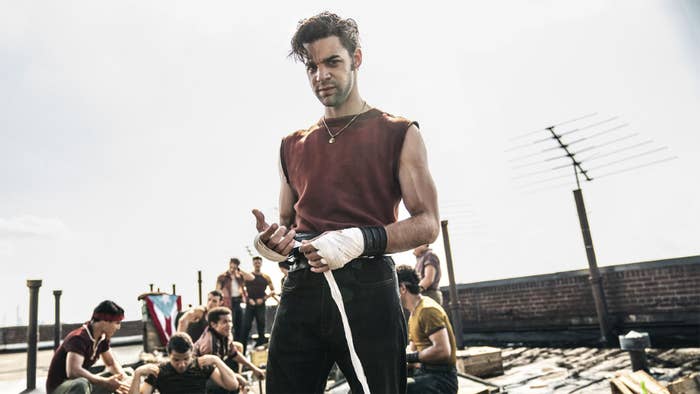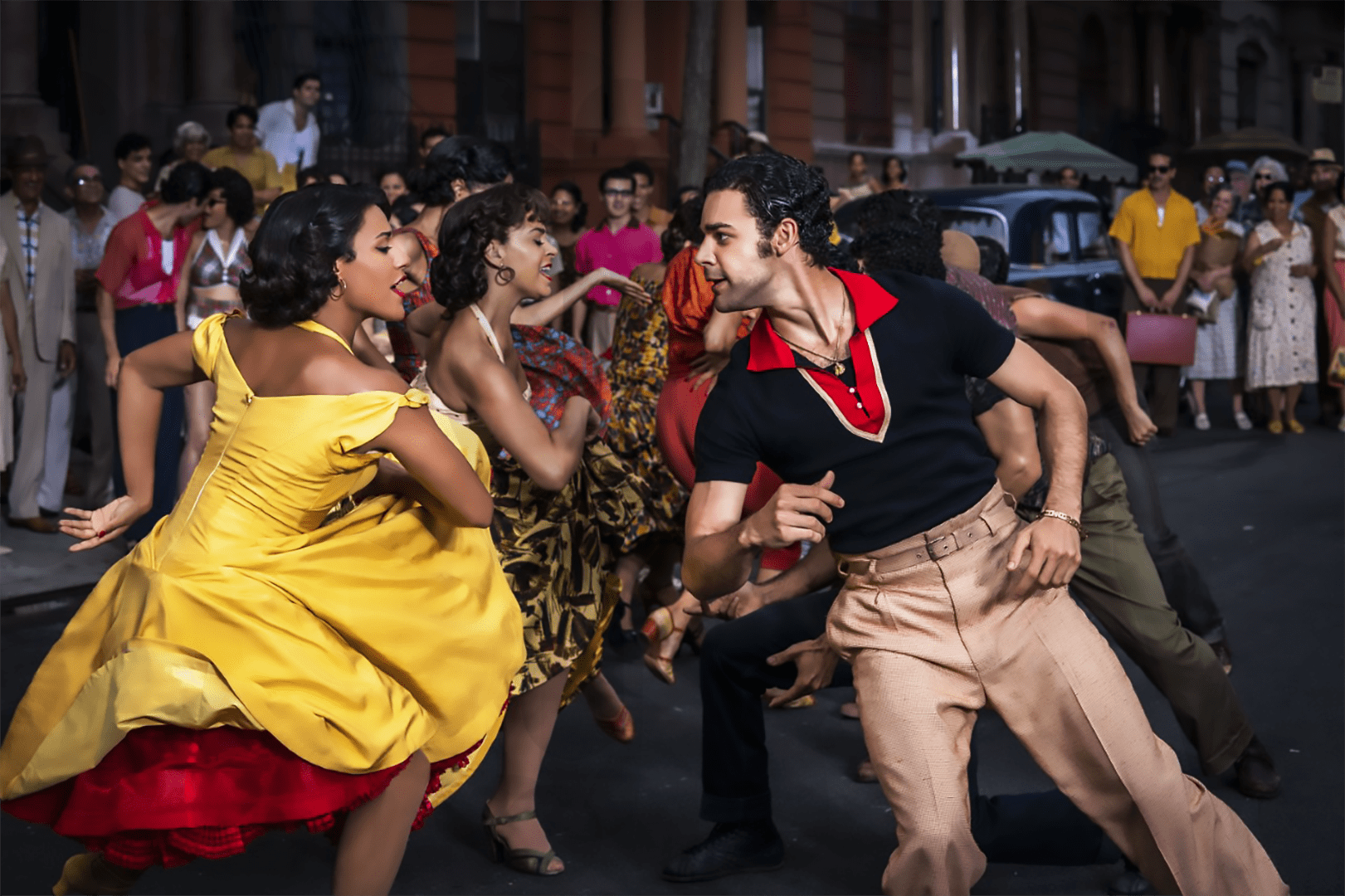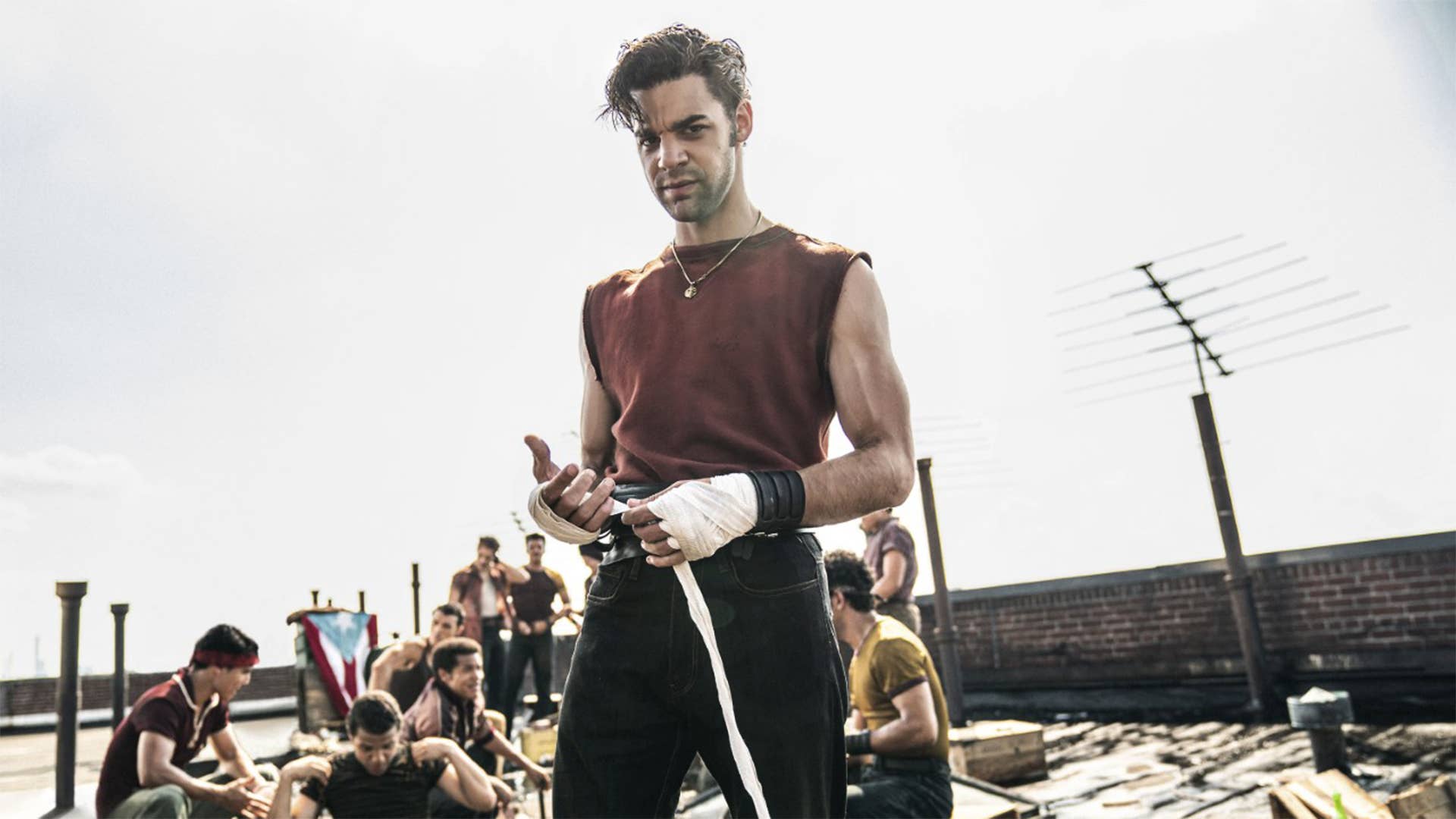
Canadian star David Alvarez is over the moon after landing the role as the iconic Bernardo in Steven Spielberg’s remake of West Side Story, which is now playing in theatres. The Montreal-born actor won a Tony award for his leading role in the Broadway production of BillyElliot the Musical at the age of 14 and became one of the youngest winners of the Tony Award for Best Actor in a Leading Role in a Musical. He then went off the grid, joined the army, and, in a full-circle twist, is finally back on the big screen in one of the most anticipated films of the year.
We caught up with the 27-year-old actor to discuss the new Bernardo explored on screen, working with Spielberg, and being a triple threat.
You won a Tony award at the age of 14 and then you went completely off the grid as a performer. I heard it took you two weeks to respond after the casting team blasted your inbox through Facebook, Instagram, Twitter to try and reach you. Tell me a bit about that audition process.
At the time, I was kind of backpacking through Mexico for a good three years, I think. So I didn’t have so much contact with the Internet and the world. I remember sitting at a hostel, I can finally log into the computer, and I see a message from Cindy Tolan, the casting director, saying, “Hey, you should audition for the role of Bernardo” but I didn’t really take a look at it until about two weeks later, when it really hit me. And I went back to the States, and I was like, ‘Oh, my God, I have to at least send a self tape. It’s Steven Spielberg. It’s all these legendary artists working together.’ That’s kind of what it took for me to come back to this business, is to be inspired by these incredible artists and want to create with them.
What was your conversation with Steven Spielberg like about how he wanted to bring to life a different Bernardo than the one in the 1961 film, which was problematic because of inaccurate representation of the Latino community?
Yeah, of course, I mean, the most important aspect was that they wanted to be authentic and they wanted to cast Latin actors for these roles. Tony Kushner and Steven Spielberg did such an incredible job in adding depth to these characters so you could really understand their struggles, where they’re coming from, on why they do the things that they do. So it was really a beautiful experience to work with them in a collaborative way to create this character of Bernardo. The incredible thing is that they’re very hand off-ish, you know, they kind of just expect you to be able to know what to bring to the table, so they put all this trust on you more than you trust yourself. It’s like that battle of like, OK, they trust me to be able to do this, and that I should be able to trust myself to be able to do this. So it really made me grow as an artist and as a person, and I’m just so grateful.
I took a lot of my parents’ experience into my character Bernardo, and kind of emphasizing that frustration, that anger of not feeling like you fit in or not feeling accepted. So it really gave a lot of resignation for me to be able to play this role.
What’s the one thing that surprised you about working with Spielberg that not many are not aware of?
I think what surprised me is that I thought since he’s the greatest director of all time, I thought he was going to be very hands on and picky about how I say my lines, and where I got to move and all this stuff, but he’s really just behind the camera. And he’s like, “Alright, just do whatever you want.” [Laughs.] I was like, “I don’t know what to do, Stephen, you got to tell you what to do.” But he just trusts you to just do what you want to do, what you feel to do. And he kind of pushes you to look deep within yourself and bring something unique to the table.
How much did you draw from your own life when it came to playing Bernardo and his struggles, because I heard there were parallels?
Absolutely. My parents are immigrants from Cuba, and they immigrated to Canada in the ’90s. I kind of saw how hard it was for them in the struggles and learning a new language and assimilating to a new culture, it’s a really hard thing to do. I took a lot of my parents’ experience into my character Bernardo, and kind of emphasizing that frustration, that anger of not feeling like you fit in or not feeling accepted. So it really gave a lot of resignation for me to be able to play this role.
You had the opportunity to talk to Stephen Sondheim while filming the movie. What was it about this icon and his legacy that you’ll always remember?
I think I’ll always remember that he’s the kind of person that does everything out of love, and out of passion. And he’s just brutally honest about his art, you know, he’s not there to sugarcoat anything. And he’s there to remind you to be a grounded artist, to be a real artist. And to make sure that whatever you’re doing comes from a place of love, and that is going to show, you know, that’s what’s important.

My favorite dance number is “America”—you and Ariana just shine and it’s so beautiful. I heard it took more than 10 days to film!
Yeah, it really was the hottest… it was a heatwave the week we were shooting, Our shoes were melting on the cement floor. That’s how hot it was. But I think what makes this number so special, especially now with Spielberg’s version, is that it’s not just about the Sharks. It’s about the whole Puerto Rican community. It’s about everyone in the streets, everyone coming together, to celebrate to their heritage, to celebrate their culture, and to not have any kind of fear of not of being accepted. So this is why I think “America” is such a beautiful number in the movie.
If every character is a little bit of the actor who plays them, how much of David is in Bernardo?
I think Bernardo might be my alter ego. [Laughs.] The person that I suppress and hide and don’t want anyone to see because it’s just horrible… So I think there’s definitely an element of that. I feel like everyone kind of fit the roles incredibly well. Cindy Tolan did such an incredible job casting this and kind of finding all these different puzzle pieces to create this masterpiece.
To be a triple threat—to sing, dance and act. What posed as the biggest challenge for you, especially after being off grid for a few years?
I think the biggest challenge was probably singing and dancing. I hadn’t done it in such a long time as I had I had been in the army for three years and then I was backpacking Mexico for another three years. So it was like six years where I was gone and not dancing or singing. So I was definitely intimidated by kind of taking on that challenge. But the good thing is that, you know, I grew up singing, dancing and acting… doing Billy Elliot on Broadway, I had some of the most incredible training you could ask for, as a kid and growing up, so it was like riding a bicycle. I could kind of get back into it and understand how to do that. The acting is… I feel like you’re always kind of acting in life. So training for acting is life experience, the more life experience you have, I feel like that makes you a better actor.
So then what’s next for you? Do we get to see back on the screen again?
I have no idea what’s next for me. So I’m just gonna take it one step at a time, when you just think about today and maybe what I’ll have for breakfast tomorrow. That’s as far as I go.

